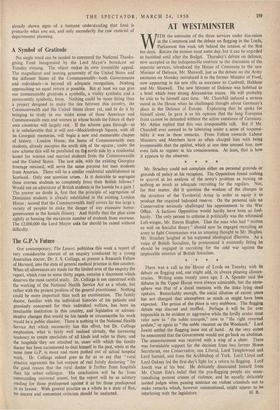The G.P.'s Future
Our contemporary, The Lancet, publishes this week a report of very considerable interest of an enquiry conducted by a young Australian doctor, Dr. J. S. Collings, at present a Research Fellow of Harvard, into the state of general medical practice in this country. When all allowances are made for the limited area of the enquiry the report, which runs to some thirty pages, remains a document which deserves the most careful study. Dr. Collings is not concerned with the working of the National Health Service Act as a whole, but rather with the present position of the general practitioner. Nothing could be more important than such an examination. The family doctor, familiar with the individual histories of his patients and genuinely concerned for their individual welfare, has been an invaluable institution in this country, and legislative or admini- strative changes that would tie his hands or circumscribe his work would be a public disaster. There is nothing in the National Health Service Act which necessarily has this effect, but Dr. Collings emphasises, what is fairly well realised already, the increasing tendency to create specialists of all kinds and refer to them, and the hospitals they are attached to, cases with which the family doctor has been accustomed to deal himself in the past, while at the same time G.P. is more and more pushed out of actual hospital work. Dr. Collings indeed goes so far as to say that " rural practice represents the last outpost of real family doctoring " for the good reason that the rural doctor is further from hospitals than his urban colleague. His conclusions will be far from commanding universal assent, but the report will be as salutary reading for those predisposed against it as for those predisposed in its favour. With general practice as a whole in a state of flux, no sincere and competent criticism should be neelected.






























































 Previous page
Previous page